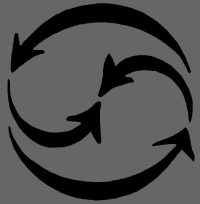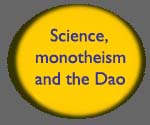Why Begin Again?
"Dao" is a Chinese word indicating a way,
a vision, or a method. "Beginning Again" refers to a
near-universal human trait: that we repeatedly seek to overturn, or to
renew, our way, our vision, our method for how to conduct our life. Our
project combines these two principles. We seek to bring the compulsive
element - our restless urge to change the pattern of our life - into
the orbit of method, of intelligent direction.
A long way from home
There is something restless in us; something
that prevents us from feeling at home in the world. Looking at
ourselves as one species within the world ecology, we may suspect that
there is only one natural habitat which we can confidently call our
own: its name is Paradox.
A delinquent species
Consider such paradoxes as this: we regularly
behave as if we were the natural predator to our own species.
More bizarre than this, is the fact that our most common object of
murder is a member of our own family (this is where the
"Selfish Gene" hypothesis starts to look quite silly).
And unlike other monogamous pair-bonding species, we have laws
with penalties, to make sure that we mate with the right person, or
even with the right animal. And there is more paradox in the contrast
between our viciousness and violence on the one hand, and the fact that
we are quite probably the most tender and the most solicitous animal
species on the planet. Certainly our capacity for empathy and care
shows at least as much richness and diversity, as our capacity for
exploitation, ruthlessness and destructiveness.
The tree of knowledge of good and evil
As far back as we have written evidence, human
beings have been trying to grapple with the nature of our own evil - to
explain or understand it, as well as to find some effective way to keep
it under wraps.
An obvious answer
The most obvious solution is that it is
the others who are the carriers of evil. Our own people - our
tribe - have found the right way, the right vision, the right method
for living the good life. It is those others - the ones who live
differently and at a distance from us: they are the ones who embody
everything that is undesirable.
Religion tells another story
Yet the world's major religions tell a
different story: every one of them has enjoined us to meet the Stranger
with respect and benevolence. Christianity goes so far as to tell us
that we must "love our enemies". And the commandment to "love our
neighbour as a being like ourselves" is likewise a demand to extend our
empathy and compassion beyond the narrow circle of our own - the
parable of The Good Samaritan makes clear that "neighbour" is meant to
extend even to those we may have been regarding as our habitual
enemies.
They often fail
And it remains true, that to burn each other's
houses down (most often with the inhabitants inside), to seduce and
abandon, to enslave, extort or exploit, or to stand aloof in the face
of others' want and starvation, are typical features of the
human scene.
In truth, we have a recurring need to Begin Again. How shall
we do this?
The way we are going to work with this draws
strongly on Shamanic and Daoist traditions - but with an underpinning
from modern disciplines such as systems theory and cultural theory.
You don't need a degree in philosophy
This is first and foremost a practical method -
a way to organise ourselves better for the business of living. I think
that theory is usually best stored away in the background; sometimes,
however, the foreground landscape becomes paradoxical and the signposts
misleading. This is when theory can give us essential orientation and
save an otherwise impossible situation. Some of us also find genuine
pleasure in the imaginary landscaping of theory; we are people who
enjoy thinking around the edges. Some of the web-links here lead into
perspectives on the philosophical and scientific implications of the
method, which you may find weird or incomprehensible. Please feel free
to search out those links which most directly appeal to you.
Dao and Cybernetics
The revolutionary step here is placing the Dao
in the context of modern systems thinking. The Dao is eloquent about
the mysterious guidance which comes to us from the deeper, hidden
realms. From the point of view of systems theory there is no great
mystery - even though it feels no less wonderful or mysterious in the
actual experience of it.
The hidden workings of the Dao, are inherent in our location
in the here and now, as a richly complex organism attuned through
millions of lifetimes of co-evolution in a richly complex environment.
The accumulated experience of our entire evolutionary tree is
continuously available and resonates within our cellular organisation,
and also in the spaces between us.
Practical magic
The co- presence of living creatures, which
means you and me whenever we meet, brings a complex (in some respects
timeless) web of forces into play. With respect to the astonishing
mystery of ourselves actually being here in the first place, we can
understand the Dao quite prosaically as a method for seeking a better
attunement to the force field we are in: to learn to ride more
skilfully the eddies and currents that regularly arise within us,
around us and between us.
How we will try
Our action-research project aims to find ways
to do exactly this - partly through the undervalued and neglected
spiritual technique of being open and honest with one another. Partly
also through opening ourselves to meditative levels of our mental
functioning so that we become more receptive to the deeper currents.
Science, Monotheism and the Dao
The great spiritual teacher and philosopher
Martin Buber many times affirmed a basic concordance between the
teachings of the Dao De Jing and his reading of the Judaic philosophy
of his forefathers.
This becomes strikingly obvious when we have freed up our minds: both
from simplistic interpretations of the Holy Bible, and also from the
conventional atheism which dismisses Judaism and Christianity as
patriarchal confidence tricks. Then a simple equation is uncovered: the
invisible, unnameable XVXH - understood as the Power which every
element in the universe is ultimately subject to - is in all important
respects identical with "The Dao That Can Not be Named".

This God-concept is the one which nurtures the
growth of science
This reading of the Higher Power in the
universe is also hospitable to the ever-changing picture which we
receive from the evolving enterprise of modern science.
No accident it happened first in renaissance
Italy
I think this is why the earlier Islam and
renaissance Christianity were able to form the cultural seed-bed for a
series of intellectual and scientific advances unique in human history.
In the background was this concept of an invisible, unnameable
universe-power - ultimately beyond our command, but whose myriad
workings in the shape of things is open to our search for a better
understanding.
This is the faith which has always animated the scientific
spirit. (The ancient Greeks were close to it, but could not resist the
intellectual pride of explaining things away). Now we can
bring a similar faith to bear on our search for a more intelligent
orientation of our passion: seeking out ways to satisfy our
hunger for a fulfilled life and a future we can believe in.
© all content: copyright reserved,
Michael Roth, March 2009
|










